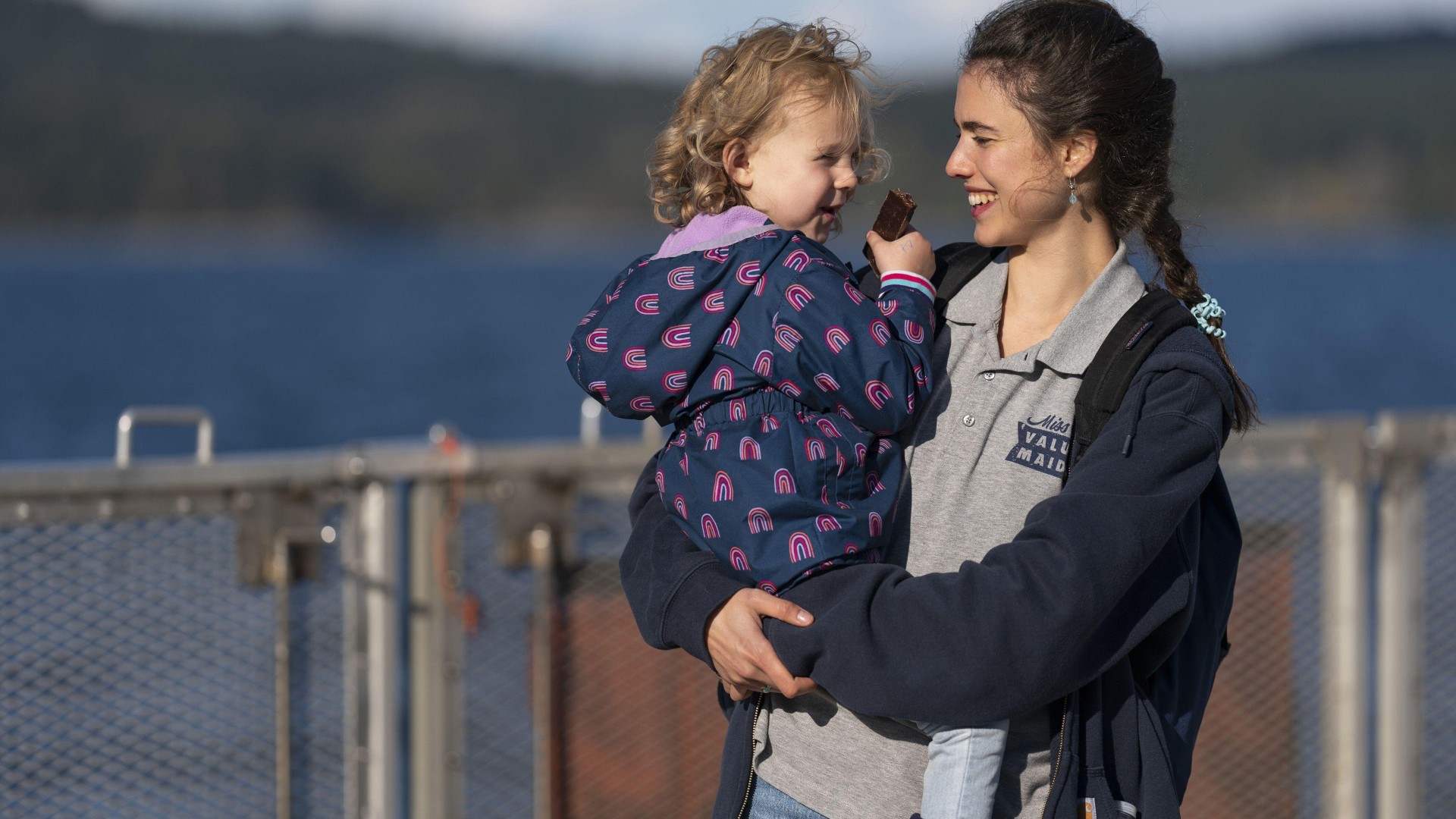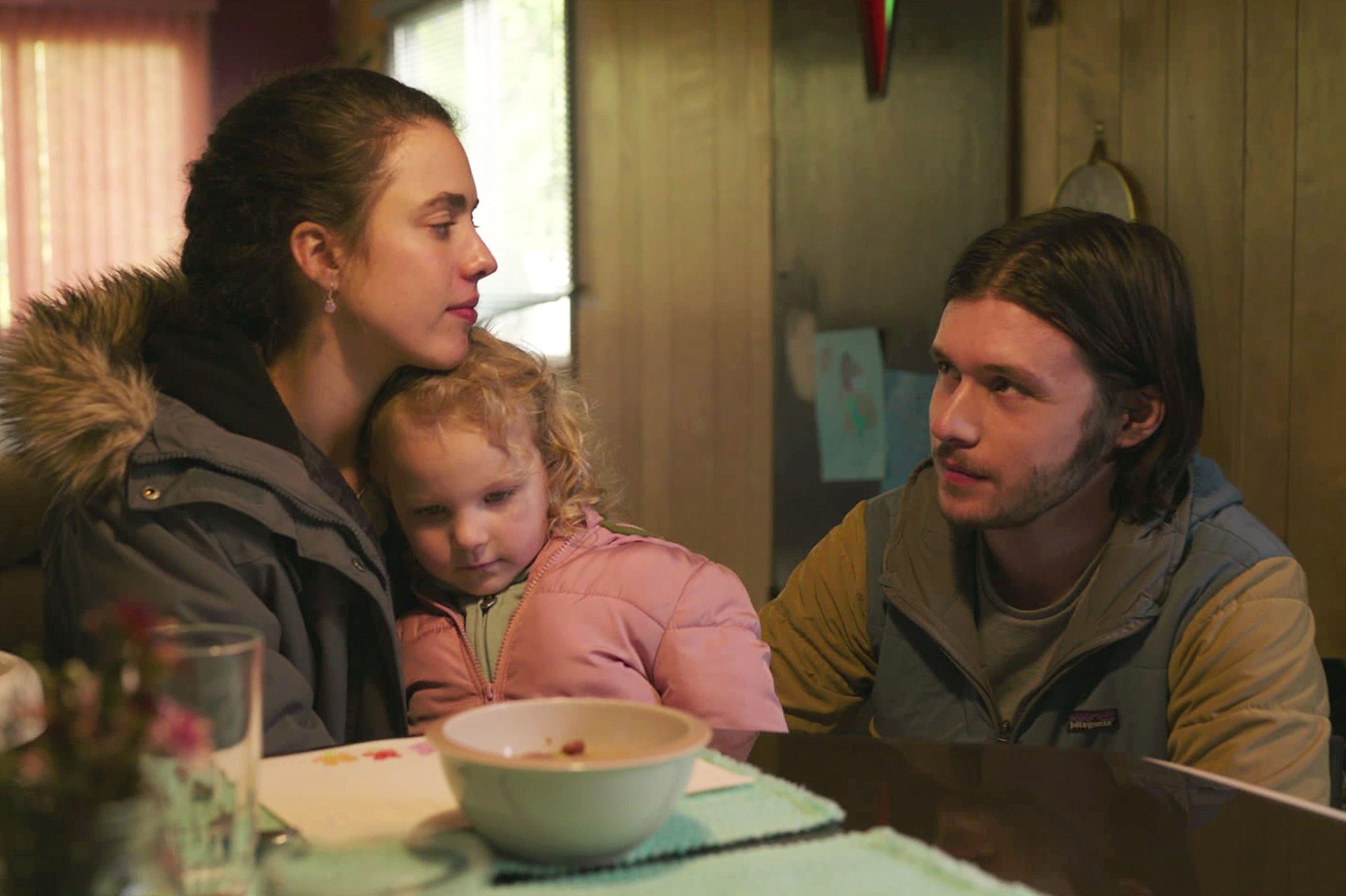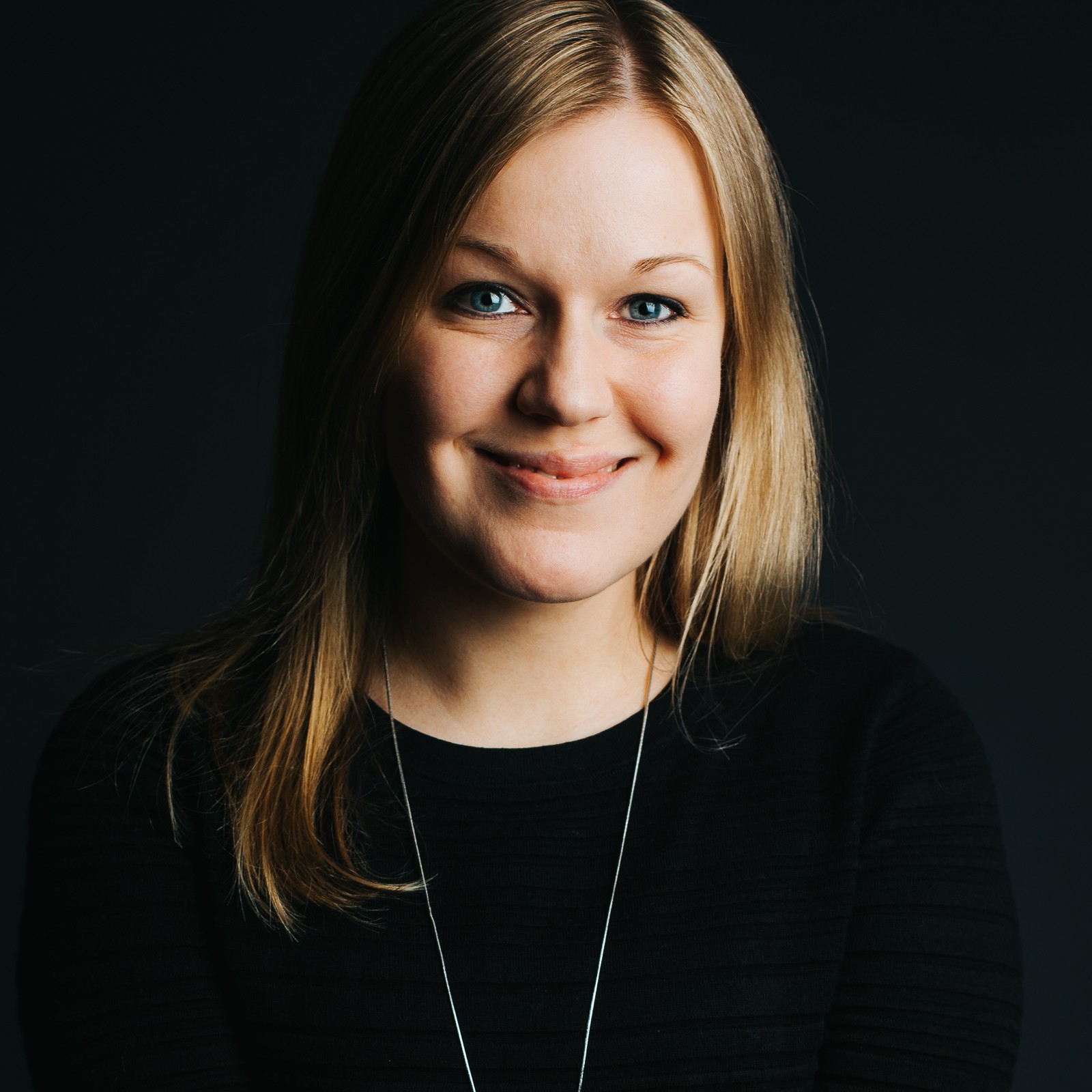Netflix’s ‘Maid’ Helped Me Open Up About Domestic Violence
With its portrayal of emotional abuse and other underrepresented forms of domestic violence, the show continues to have a profound impact on victims and survivors.


Trigger warning: This article contains descriptions of domestic violence, which includes physical, sexual, verbal, and emotional abuse.
When I think of my high school sweetheart, I think of glass—the shattered driver’s side window of my Ford Escort raining down beside me. My boyfriend stood on the other side of the door, so angry with me he had just slammed it with all of his strength. A girlfriend of mine sat in the passenger seat, both of us stunned into silence.
“I didn’t mean to do that,” my boyfriend said instantly after my window broke. He was only ever remorseful after some damage had been done—usually, once I was sobbing.
It was a hot, pitch-black night in my rural hometown in the summer of 2000. I was 17 and heading into my senior year of high school. A large crowd of teens had gathered at the lake and my boyfriend found me there. He was fuming because I had gone out. To go out with a friend was to invite the possibility of “something bad” happening.
Typically, we fought because he’d seen me speaking to another guy—any guy—at school. Sometimes it was because he didn’t like some aspect of my outfit and believed I was seeking attention from other men. He never learned to trust me and often called me names. He told me I was “heartless.” We had been together almost three years and fought for about as long as we had been together.
The morning after he shattered my window, my boyfriend arrived bright and early at my parents’ house with a matching replacement window he had found in a junkyard. A car buff, he promptly installed it himself.
I told my parents it was an accident.
Get exclusive access to fashion and beauty trends, hot-off-the-press celebrity news, and more.
Last month, a Facebook post from a woman I went to high school with caught my attention. Jamie, 40, indicated that she was watching Netflix’s Maid and that the show deeply resonated with her.
“I don't talk about it often, but I should. Every woman should,” she wrote. “I was both verbally and physically abused in my last marriage. I left for my children and myself...for us to have a much happier and healthy life. I was made to feel ashamed of myself for ending it...how selfish I was...but what no one understands is that I wouldn't of survived if I would've stayed. And I was my children's main caregiver... still am. The verbal abuse daily was mentally destroying me...I started believing the words he said to me, how worthless I was and how I am just a hair dresser with no goals in life...how I don't make an impact on anyone's life like he does. Too much hurt to mention. And it's true. Most of the time they play the victim and put on such a good guy image, they'll have some fooled. While watching this and it all feeling so surreal...there needs to be more support for these women and children. Xoxo”
Jamie’s post hit a nerve for me; it has been 20 years since I ended my high school relationship, but the abuse has stayed with me. When I saw the post, I hadn’t yet watched Maid, but had seen some buzz about it. The Netflix limited series, which premiered in October, is based on a 2019 memoir by Stephanie Land: Maid: Hard Work, Low Pay, and a Mother’s Will to Survive. It has garnered attention for its honest portrayal of the systemic hurdles faced by single mothers living in poverty, as well as its depiction of often underrepresented forms of domestic violence, including emotional and verbal abuse. At first, the show’s protagonist, Alex (Margaret Qualley), doesn’t realize that her boyfriend, with whom she shares a child, is abusive. He screams at her, is violent around her, and attempts to scare and manipulate her, but he hasn’t hit her. I decided to stream the first episode that same night.
As I watched the show, I also watched the response to Jamie’s message unfold. People I recognized from high school and others I didn’t know were commenting, sharing, and reacting. While all of the commenters offered supportive messages to Jamie, some women went a step further and shared that they, too, had experienced domestic violence. I was surprised and saddened and thrilled to see it. Here was a group of women sharing the truth of their abuse, not in a private forum or a trusted circle of friends but in public on Facebook. Their courage was inspiring.

Alex (Margaret Qualley) and Sean (Nick Robinson) with their daughter, Maddy (Rylea Nevaeh Whittet) in Netflix's Maid.
When I told a close friend from high school, Megan Denton-Gillette, about Maid and the Facebook dialogue I witnessed, I discovered she’d been having conversations about the show with her clients. Denton-Gillette is the director of clinical services and community counseling at Call for Help, a nonprofit mental health agency in East St. Louis, Illinois. One of her main areas of clinical practice is working with survivors of trauma.
“I’ve had several clients bring Maid up in session. For some of my clients [who have experienced abuse in relationships], it fits in with the content we were already discussing and they found it to be really empowering and validating. For others, it has opened up the door for that discussion to happen,” says Denton-Gillette. “It helps with increasing self-compassion if [survivors] are watching this cycle of abuse happen to someone else on the screen. As humans, we tend to have more compassion toward someone else [than we do toward ourselves]. People see parallels to their own stories [in the show] and are able to take something from that and apply it to themselves.”
This was true for Jamie. As I reflected on the impact of her Facebook post, I reached out to her to thank her and ask if I could share her story further. Jamie told me that while watching Maid, she found the show’s depiction of domestic violence very similar to the abuse she experienced. The show also captured what it is like when a person is financially dependent on their abuser—another bind Jamie identified with. She’s since been able to leave the abusive relationship and purchase a house for herself and her kids, which has brought a new sense of peace for her.
“I can relate to [Maid] with what I went through with the verbal abuse and the belittling and the control that you allow somebody to have over you,” she says. “I think that’s why women hate to speak out, too—because you feel so weak. A lot of people are like, ‘Why would you let somebody do that to you or not just get out of it?’ It’s not that easy.”
According to the National Coalition Against Domestic Violence, one in three women in the United States have experienced some form of physical violence by an intimate partner. (The coalition also offers state-by-state statistics on abuse.) Domestic violence has increased during the pandemic; a February 2021 report from the National Commission on COVID-19 and Criminal Justice states that domestic violence rates were up by 8.1 percent following COVID-19 stay-at-home orders, though the number is likely significantly higher. Women of color are disproportionately harmed by intimate partner violence.
“What we’ve known for decades is that anyone, absolutely anyone, can experience abuse by a partner,” explains Dr. Tami Sullivan, an associate professor of psychiatry and director of Family Violence Research and Programs at Yale University. “It cuts across every race, ethnicity, age, income, and education level, which is why it's critically important for us to be teaching all people about what abuse is when they’re younger—that it is not only physical abuse. Psychological or emotional abuse can be just as detrimental to your health and wellbeing, and psychological abuse happens much more often.”
Here was a group of women sharing the truth of their abuse, not in a private forum or a trusted circle of friends but in public on Facebook. Their courage was inspiring.
Land conveyed the harm of emotional abuse in her memoir, and the message is in turn reflected in the show. “In my own life, I didn't realize the extent of the abuse I experienced for many, many years,” Land tells Marie Claire. “I started writing about it quite a bit after I graduated college. [I] joined writing groups of women who had been emotionally abused, and learned enough to help me finally process what I'd been through...I was never told that [the abuse I experienced] was valid until I had some kind of physical proof. It's really powerful to see so many people in my mentions on social media talking about their experiences, and saying ‘emotional abuse is violence.’”
Brittany, 29, was among the women who commented on Jamie’s post sharing that she, too, had survived an abusive relationship. “Proud of you for sharing your story and proud of you for getting away,” she wrote. “You’re not alone. I still deal with trauma from abuse from my last relationship. It takes a very strong person to be able to get out of that situation. It leaves scars that sometimes never heal. I love you and I’m always here for you!”
In her early twenties, Brittany was in a four-year relationship with a boyfriend who was verbally and emotionally abusive. The two met in the Illinois town where they both attended college, and Brittany’s boyfriend later followed her to Chicago after she moved there for a job in the music industry. The fighting began with Brittany’s boyfriend blaming her for having to “uproot his life” and move to Chicago to be with her, though he was also very jealous and insecure anytime she went out with friends and didn’t like her attending events as part of her job. He constantly criticized her career choice even though he knew she loved it, and belittled her decision-making in general.
Brittany began seeing a therapist and realized her relationship with her boyfriend was holding her back in life. When she got serious about leaving him, he frightened her by screaming in her face, calling her names, and locking her in a bedroom with him. She worried that if she stayed, the relationship could turn violent. A few months later, she left her boyfriend for good. Following the release of Maid two years later, Brittany binged the whole series in one night.
“It was just that intriguing that I couldn’t [stop watching it],” she says. “[The main character] tried to get out of a bad situation, but when she went to her resources there were just all of these loops she had to go through. It’s hard to get out of certain situations and it’s so easy to fall back into the same patterns.”

Alex cleaning one of her client's homes in order for her and her daughter to survive.
Candice, 50, has not watched Maid—she doesn’t subscribe to Netflix—but she could identify with Jamie’s Facebook post and was among the women to comment in commiseration. Candice had never spoken publicly about her experiences with domestic abuse before, proving that non-viewers are also impacted by the dialogue around domestic violence that Maid has brought about.
“So happy for you!” she commented on Jamie’s post. “I've dealt with both in different relationships. The mental is actually worse. Keep moving forward beautiful!!”
Candice first experienced domestic violence at 17 when she married a physically abusive man. After suffering black eyes, a busted lip, a broken foot, and more, she was finally able to pursue divorce following her husband's imprisonment on cocaine charges. In her next serious relationship, Candice’s partner’s jealousy, controlling nature, violent actions, and alcoholism grew so frightening that Candice fled for the safety of herself and her children. She hadn’t been working and had little professional experience, but she received a church donation that helped her get into a rental home and she started to clean houses to support her family—just as the main character does in Maid.
A year later, Candice met her next husband. As she began to advance her career in banking and started spending one night per month with female friends, Candice’s new husband became increasingly verbally and emotionally abusive. The more she flourished, the more her husband ridiculed her, criticizing both her career and her physical appearance. Candice plummeted into a period of depression, but eventually grew fed up and asked for a divorce, which was finalized in September of this year. Today, Candice says she enjoys being independent and is relieved to be free of the abuse.
I was never told that [the abuse I experienced] was valid until I had some kind of physical proof.
There is much that Netflix’s Maid gets right about domestic violence, but viewers also need to be aware that not all domestic violence cases look like the one portrayed in the show. Nor does every victim have the ability or resources to successfully escape their abuser.
“One of the things that is really cool about Maid is that many of the depictions are accurate—kudos to Netflix for capturing that domestic violence is not just the black eyes and the broken bones. Kudos for focusing on psychological abuse," says Sullivan. "But plenty of people can say ‘my partner didn’t punch a hole in the wall’ or ‘I wasn’t picking glass out of my daughter’s hair.' I wish there was a way to depict more than just one type of victim/survivor—the people who don’t look like the character in Maid.”
Still, the show has brought a much-needed conversation about domestic violence to a mainstream audience and has fostered a deeper understanding of the many different forms of abuse. Victims and survivors have found elements of their own relationships mirrored back to them through Maid. And for many of us, the show has served as a catalyst for speaking truth to power about our experiences. I am a writer who has been sharing personal stories for years, yet I’ve refrained from publishing anything about my high school boyfriend until now. When I think of that relationship, I still feel sad, overwhelmed, and angry for having been treated so poorly, but it helps to be reminded that I’m not alone. I, and so many other survivors and victims of domestic violence, have Maid to thank for that.
Anyone seeking free, confidential help with domestic violence can utilize the National Domestic Violence Hotline, which offers 24/7 online chat, text, and phone call options for support. The hotline’s website also provides a list of warning signs of abuse and detailed information on how abuse relates to power and control.
Linsey Maughan is a writer living in Chicago, where she is at work on a memoir about women navigating cancer, body image, relationships, and grief. Her work has been published by Brevity, HuffPost, The Rumpus, and Vol. 1 Brooklyn, among other outlets, and she is the recipient of writers' grants from the City of Chicago and the Illinois Arts Council. She holds an MFA in Creative Writing from the University of Florida.
